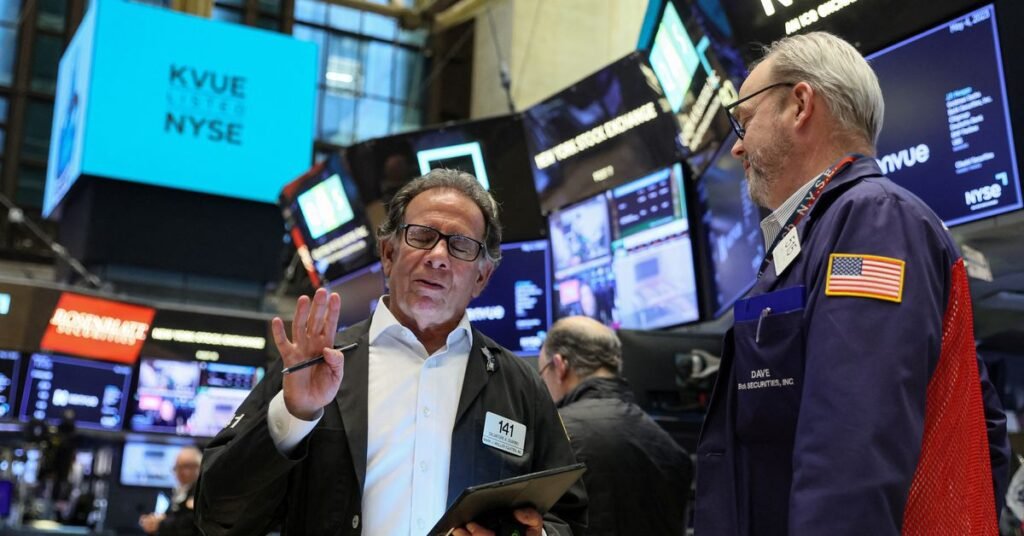SINGAPORE, Might 4 (Reuters) – A world measure of shares fell for the fourth consecutive day whereas the greenback gained some floor because the European Central Financial institution raised charges on Thursday and signalled the necessity for extra tightening a day after the U.S. Federal Reserve additionally raised charges.
U.S. Treasury yields have been decrease whereas oil costs stabilized after sharply declining earlier within the week.
Together with investor indigestion over central financial institution messaging, Wall Avenue inventory indexes have been additionally underneath strain from one other rout in U.S. financial institution shares, which have reeled from the collapse of a 3rd main regional financial institution over the weekend.
European shares closed decrease after the ECB, the central financial institution for the 20 nations that share the euro foreign money, raised rates of interest by 25 foundation factors to three.25% and signalled that extra tightening could be wanted to tame inflation.
In distinction to the ECB, the Fed had implied that its marathon mountaineering cycle could also be ending.
Whereas the concept of a pause in U.S. fee hikes was welcome information for U.S. buyers, it got here with the implication that the economic system is slowing, stated Lauren Goodwin, economist and portfolio strategist at New York Life Investments in New York.
“This stability between potential rate of interest stability and a rise in recession danger is what markets are attempting to digest as we speak,” stated Goodwin.
Specifically, the economist noticed the Fed's reference to tightening credit score circumstances as a affirmation of her expectations of an financial downturn.
“It is extremely unlikely we'll keep away from a recession,” Goodwin stated. “We're on a transparent path towards a recession within the subsequent few months.”
The Dow Jones Industrial Common (.DJI) fell 286.5 factors, or 0.86%, to 33,127.74, the S&P 500 (.SPX) misplaced 29.53 factors, or 0.72%, to 4,061.22. The Nasdaq Composite (.IXIC) dropped 58.93 factors, or 0.49%, to 11,966.40.
All three of Wall Avenue's main indexes marked their fourth straight day of losses. For Nasdaq it was its longest stretch of losses since December.
MSCI's gauge of shares throughout the globe (.MIWD00000PUS) shed 0.47% reflecting its first four-day dropping streak since mid-March.
In distinction, rising market shares (.MSCIEF) rose 0.70% after three straight periods of declines.
Including to U.S. investor worries, one other U.S. regional financial institution – PacWest Bancorp (PACW.O) – signalled troubles days after First Republic collapsed.
The S&P 500 financial institution index (.SPXBK) closed down 2.8% whereas the KBW regional banking index (.KRX) misplaced 3.5%.
Tim Ghriskey, senior portfolio strategist at Ingalls & Snyder, famous that considerations about banks, and the tighter lending circumstances they're now providing, spilled into different sectors such because the Dow Transports index (.DJI), which closed down 1.3%.
“With the banking disaster we'll have tighter credit score. There will be much less lenders prepared to lend,” stated Ghriskey who notes the instance that airways will face larger charges and fewer out there credit score that can be purchased new plane.
Amongst currencies, the greenback gained towards the euro as buyers digested the ECB's fee hike.
The greenback index rose 0.188%, with the euro down 0.43% to $1.1011. The Japanese yen strengthened 0.39% versus the dollar at 134.16 per greenback.
“The financial coverage dynamics are roughly totally priced in right here at this level by way of the tightening cycle. Now, it’s going to be a give attention to the bets on when the Fed begins to ease, how a lot it eases and the way that pertains to what (different) central banks are doing,” stated Shaun Osborne, chief FX strategist at Scotiabank in Toronto.
In Treasuries, benchmark 10-year yields and 2-year yields sank as buyers fearful about regional banks and indicators of a weakening economic system.
Benchmark 10-year notes have been down 3.4 foundation factors to three.369%, from 3.403% late on Wednesday. The 30-year bond was final up 0.9 foundation factors to yield 3.7243%, from 3.715%. The two-year word was final was down 17.3 foundation factors to yield 3.7656%, from 3.939%.
In vitality, crude oil costs stabilized after three straight days of sharp declines because of demand considerations in main consuming nations ensuing from worries in regards to the international economic system.
U.S. crude settled down 0.06% at $68.56 per barrel and Brent ended at $72.50, up 0.24% on the day.
In the meantime, spot gold had touched its highest degree in years as U.S. banking considerations accelerated a flight to the safe-haven asset.
Spot gold added 0.6% to $2,050.66 an oz.. U.S. gold futures gained 0.95% to $2,047.90 an oz..
Reporting by Rae Wee and Vidya Ranganathan; Enhancing by Sam Holmes
: .

